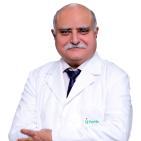
Heart Attack: Myths and Facts
A heart attack, also medically known as a myocardial infarction, is a serious medical condition that occurs when the blood supply to the heart muscle is severely reduced or blocked, leading to damage or death of a part of the heart muscle. This happens when one or more of the coronary arteries, which supply the heart with oxygen-rich blood, become narrowed or blocked due to the formation of blood clots, atherosclerosis (the build-up of fatty deposits or plaque in the arteries), or other factors. As a result, the affected part of the heart muscle doesn't receive enough oxygen, and if the blockage is not promptly resolved, it can cause irreversible damage to the heart tissue.
Myths and facts about heart attacks are important to understand because misconceptions can lead to delayed treatment or unnecessary anxiety. Here are some common myths and their corresponding facts. Here are some common heart attack myths and the corresponding facts:
Myth 1: Heart attacks only happen to elderly individuals.
Fact 1: Heart attacks can occur in People of all ages, including young adults. While the risk increases with age, Lifestyle factors and genetics also play significant roles.
Myth 2: Heart attacks are always accompanied by severe chest pain.
Fact 2: Not all heart attacks present with intense chest pain. Symptoms can vary and may include discomfort in the chest, shoulder, arm, neck, or jaw. Shortness of breath, nausea, Light-headedness, and cold sweats are also possible symptoms.
Myth 3: Heart attacks are always fatal.
Fact 3: With prompt medical attention, many people survive heart attacks. Advances in medical treatment have significantly improved outcomes.
Myth 4: Women are not at risk of heart attacks.
Fact 4: Heart disease is the leading cause of death for women in many countries. Women can experience heart attacks, and their symptoms may differ from those in men. They may have Subtler symptoms, making it important to recognize the warning signs.
Myth 5: Heart attacks are always sudden and unexpected.
Fact 5: Some heart attacks can be preceded by warning signs, such as chest discomfort or shortness of Breath, in the days or weeks leading up to the event.
Myth 6: Aspirin can cure a heart attack.
Fact 6: Aspirin can help during a heart attack by thinning the blood and reducing the size of a blood clot. However, it’s not a cure, and immediate medical attention is crucial.
Myth 7: heart attacks only happen to people with obvious risk factors like smoking or obesity.
Fact 7: While these factors increase the risk, heart attacks can happen to individuals with no apparent risk factors Genetics, Family history, and other factors also play a role.
Myth 8: Heart attacks are always linked to high Cholesterol.
Fact 8: High Cholesterol is a risk factor, but not everyone with high cholesterol will have a heart attack. Likewise, some individuals with normal cholesterol levels may still experience heart attacks.
Myth 9: Heart attacks always cause excruciating pain that you can’t ignore.
Fact 9: Some heart attack symptoms can be mild or mistaken for other conditions. It’s important to Pay attention to any unusual symptoms and seek medical help if in doubt.
Myth 10: You should drive to the hospital during a heart attack.
Fact 10: It’s safer to call 911 for an ambulance. Paramedics can provide immediate care and transport you to a hospital equipped to handle heart emergencies.
Understanding these myths and facts can help individuals recognize the signs of a heart attack, take them seriously, and seek prompt medical attention when necessary. Remember that it's essential to know the signs and symptoms of a heart attack, as early detection and immediate medical attention can save lives.
Categories
Clear allMeet the doctor

- Cardiac Sciences | Adult CTVS (Cardiothoracic and Vascular Surgery) | Heart Transplant | Heart & Lung Transplant | Vascular Surgery | Paediatric CTVS (Cardiothoracic and Vascular Surgery)
-
38 Years
-
1600



















